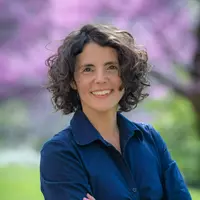Implementing Evidence-Based Strategies in an Experiential Learning Course to Enhance Self-Efficacy, geoSTEM Identity, and Career Awareness
Authors
 Meagen Pollock, College of Wooster
Meagen Pollock, College of Wooster
 Greg Wiles, College of Wooster
Greg Wiles, College of Wooster
 Lisa Kastor, College of Wooster
Lisa Kastor, College of Wooster
 Missy Schen, College of Wooster
Missy Schen, College of Wooster
In Spring 2021, we offered a hybrid experiential learning course that implemented evidence-based strategies for increasing students' self-efficacy, geoSTEM identity, and awareness of geoscience careers. Students engaged in four types of activities: community partner project, professional training, professional development, and reflection. In the community partner project, students gained authentic hands-on experience solving a local environmental problem related to stormwater runoff management. Alumni and representatives from local environmental firms served as consultants to provide guidance and offer feedback on their work. To support this authentic experience, students completed a state-specific online Stormwater Management Training series, obtaining a professional certificate of completion after each session. In partnership with our Career Planning office, students also participated in 10 professional development activities that covered career resources, application materials, technical and non-technical workforce skills, job searching, and networking. Students critically analyzed their experiences through informal and formal reflections, such as group discussions, written and video responses, and one-on-one meetings with instructors and Career Planning staff. Reflection prompts asked students to consider their professional development, motivations, lived experiences, identities, and self-efficacy. Reflections occurred on a weekly basis with seven formal assignments distributed across the beginning, middle, and end of the semester. Preliminary qualitative analysis of reflections suggests that, by the end of the class, students grew more confident in their abilities to overcome challenges, more likely to see themselves as geoscientists, and more favorably disposed to career paths in the geosciences. In this presentation, we will share course materials, present assessment results from qualitative analysis of reflections and quantitative analysis of pre- and post-survey data, and discuss the evidence-based strategies implemented in the course. Understanding the strategies that are most effective for supporting and retaining students has significant implications for workforce preparation and broadening participation in the geosciences.
- Community Engagement
- Course Resources
- Developing Geocompetencies
- Geoscience Education Research
- Professional Development for Undergrads, Grads and Faculty
- Attracting and Supporting Students
- Student Learning
- Teacher Preparation, Professional Development and Policy Issues
- Diversity, Equity and Inclusion
